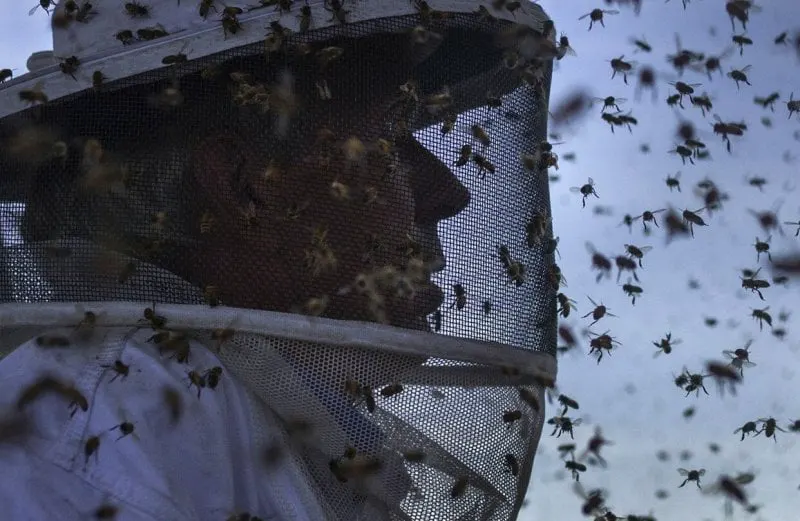Viewpoint: A world without pollinators? Don’t fall for ‘lurid tales of bee Armageddon’
Viewpoint: A world without pollinators? Don’t fall for ‘lurid tales of bee Armageddon’


A torrent of media stories from 2013-2014 presented frightening tales of “unprecedented” colony collapse disorder (CCD) among honeybees, conjuring up visions of a “bee-pocalypse” and “a world without bees,” a world in which flowers and agriculture would be decimated.
Many articles blamed neonicotinoid pesticides, while others added climate change and biotech (GMO) crops as likely culprits.
…
As to “colony collapse disorder” (sometimes called “disappearing disorder”), major bee die-offs were reported in Ireland as far back as 950 AD!… [D]ie-offs are not unprecedented.
Of course studies have purported to demonstrate the toxicity of neonics. But many were conducted in laboratories, using doses and application methods that bear no relation to what farmers do or what bees experience in the real world, where they might encounter neonic levels in pollen and nectar measured in parts per billion or trillion: the equivalent of a few seconds in 32 or 32,000 years, respectively.
Multiple field studies– in actual farmers’ fields –have consistently shown no adverse effects on honeybees at the colony level from realistic exposures to neonics.
It’s vital that we protect our honeybees, bumblebees and wild bees. But that means understanding history, science, modern agriculture and bee life expectancy – so that we are not so easily snookered by lurid tales of bee Armageddon.
Read the original post

 | Videos | More... |

Video: Nuclear energy will destroy us? Global warming is an existential threat? Chemicals are massacring bees? Donate to the Green Industrial Complex!
 | Bees & Pollinators | More... |

GLP podcast: Science journalism is a mess. Here’s how to fix it

Mosquito massacre: Can we safely tackle malaria with a CRISPR gene drive?

Are we facing an ‘Insect Apocalypse’ caused by ‘intensive, industrial’ farming and agricultural chemicals? The media say yes; Science says ‘no’
 | Infographics | More... |

Infographic: Global regulatory and health research agencies on whether glyphosate causes cancer
 | GMO FAQs | More... |

Why is there controversy over GMO foods but not GMO drugs?

How are GMOs labeled around the world?

How does genetic engineering differ from conventional breeding?
 | GLP Profiles | More... |

Alex Jones: Right-wing conspiracy theorist stokes fear of GMOs, pesticides to sell ‘health supplements’




 Trust issues: What happens when therapists use ChatGPT?
Trust issues: What happens when therapists use ChatGPT? Fighting deforestation with CO2: Biotechnology breakthrough creates sustainable palm oil alternative for cosmetics
Fighting deforestation with CO2: Biotechnology breakthrough creates sustainable palm oil alternative for cosmetics Viewpoint: Video — Big Solar is gobbling up productive agricultural land and hurting farmers yet providing little energy or sustainabilty gains
Viewpoint: Video — Big Solar is gobbling up productive agricultural land and hurting farmers yet providing little energy or sustainabilty gains California, Washington, Oregon forge immunization alliance to safeguard vaccine access against federal undermining
California, Washington, Oregon forge immunization alliance to safeguard vaccine access against federal undermining Viewpoint — Fact checking MAHA mythmakers: How wellness influencers and RFK, Jr. undermine American science and health
Viewpoint — Fact checking MAHA mythmakers: How wellness influencers and RFK, Jr. undermine American science and health 30-year-old tomato line shows genetic resistance to devastating virus
30-year-old tomato line shows genetic resistance to devastating virus The free-range chicken dilemma: Better for birds, but with substantial costs
The free-range chicken dilemma: Better for birds, but with substantial costs ‘You have to treat the brain first’: Rethinking chronic pain with Sanjay Gupta
‘You have to treat the brain first’: Rethinking chronic pain with Sanjay Gupta
